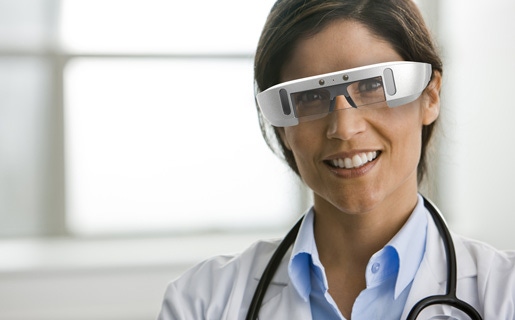The impending fourth wave of digital technology—connected wearable devices—will have profound effects on the art and science of medicine. A surgeon and innovator considers the near future to forecast what may soon be available to patients and clinicians.
March 29, 2017

The impending fourth wave of digital technology--connected wearable devices--will have profound effects on the art and science of medicine. A surgeon and innovator considers the near future to forecast what may soon be available to patients and clinicians.
Alec Bari, MD
Evena Medical's clinical AR glasses platform enables bedside nurses to see "through" a patient's skin, making it easier to see and access hard-to-locate veins.
As startups lead the way and major players make moves to enter the market, connected healthcare is poised to advance from imagination to reality. Augmented reality (AR), wearables, and the Internet of Things (IoT) are expected to have a major impact on healthcare delivery in the next few years by expanding access to data and facilitating interactions between providers and patients. This impending fourth digital wave, like personal computers, the Internet, and mobile technology before it, will have profound effects on the art and science of medicine.
Patients will first encounter advances in digital health at home. Here, connected devices such as pill bottles and medication dispensers will allow our aging population to maintain more autonomy at home longer. Sensors incorporated into garments will track and direct activity during rehabilitation. Data collected from implantable devices and health wearables will better track chronic conditions such as high blood pressure and diabetes. This will allow physicians to create tailored treatment plans as well as personalized educational tools for patients.
Digital personal assistant systems such as Amazon's Alexa and Google's Home may soon be enlisted to help reinforce health and fitness activities. Similarly, telemedicine using real-time high definition streaming between physician extenders and physicians through smart glass may restore the age of the house call.
In case of a medical emergency, first responders and emergency physicians may soon be able to use AR glasses to deliver care faster when every second matters. Using near-infrared light and cameras, veins can be visualized and displayed into a provider's smart glasses. These same glasses will soon be able to communicate ultrasound or other imaging data to facilitate trauma exams and invasive procedures, such as central lines.
The connected surgeon will soon be able to use a combination of smart glasses and fluorescent markers to avoid injury to nerves, lymphatic vessels, or blood vessels. Avoiding these vital structures will make surgery safer and more effective for patients by preventing serious complications. The integration of MRI data with smart glasses will allow for real-time stereoscopic 3-D navigation in cancer removal and has already made advances in neurosurgery.
In clinics and hospitals, AR glasses provide the opportunity for providers to access data while not interrupting an organic physician-patient relationship. The first broad scale product to enter the field, Google Glass, has arguably already begun to find a niche in healthcare. Startups such as Augmedix are using Google Glass to facilitate recordkeeping by streaming an encounter to the transcriptionist. This allows the physician to devote more time and energy to direct patient care. This is just the beginning, as multiple points in the time-sensitive, high-cost arena of healthcare can benefit from efficiencies provided by these emerging technologies.
These advances will not be without their challenges. Regulatory barriers make innovation in this space time consuming and costly. The volume of data that will soon be available will also require careful analysis. Lastly, ensuring privacy and data security will be paramount as will the determination between provider, payer, and patient as to who owns and controls the data.
|
Dr. Alec Bari is a Stanford-trained Plastic and Reconstructive Surgeon and experienced innovator in the medtech space. He currently serves as chief innovation officer at Evena Medical, a leading developer of smart glasses for healthcare.
[Top image courtesy of EVENA MEDICAL and headshot courtesy of ALEC BARI, MD]
You May Also Like



